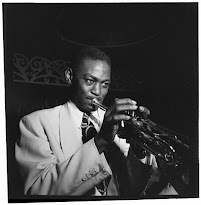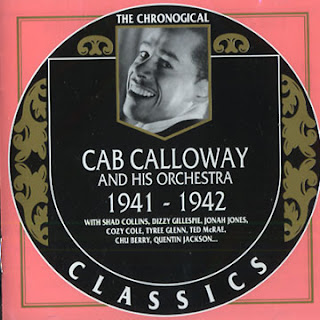Duke Ellington - The Uncollected Duke Ellington and his Orchestra Volume 1 (1946)
This compilation is a radio transcription from March 28, 1946 and is predictably another terrific album by a terrific edition of Duke Ellington and his Orchestra. According to the liner notes by Patricia Willard, the band won both the Swing and Sweet band categories in the 1946 Downbeat poll. As a result Downbeat eliminated those categories and replaced them with "Favorite Band", which Ellington won in 1947! He also won Esquire Magazine Gold Awards for best arranger and band in 1945, 1946, and 1947 and won the Pittsburgh Courier national band context trophy for 1947-1948. That's a lot of awards, but gives us an indication of how highly regarded this edition of the band was.
Oscar Pettiford was the bassist and he sounds terrific. Being part of the bop movement, hie helped add a bebop presence to the music which is alluded to hear and there, but overall this music had Swing stamped all over it. Pettiford had the technical abilities of Blanton and some of the bebop vocabulary under his finger, but when he walked a bass line he was a Swing player. His eighth note feel was always closer to the choppy dotted eighth-followed-by-sixteenth note feel that characterizes pre-bebop jazz. Bebop brought more of a triplet eighth note feel that evened out as the tempos got faster and the older style of approaching eighth notes became corny and outdated. Pettiford maintained that feel and it affected his walking bass lines which fit right in with the Ellington band. He was not a smooth player, he hit the strings hard and made those quarter notes really pop out and is reminiscent of the era when drummers kept time on the bass drum. That feel stayed with him and can still be heard on his recordings from the 1950s.
There are a couple of really nice features for other members of the band that I'd like bring up: Johnny Hodges up first. He's often featured on Ellington records and here he sounds majestic on "Passion flower", one of his great showcases dating from 1941. This tune features rich, harmonic chords and given that Hodges also gets showcased on the equally harmonically adventurous "Blood Count", "Prelude to a Kiss", "Warm Valley", etc. I'm thinking that this formula was a favorite of Ellington and Strayhorn's. Clarinetist Jimmy Hamilton begins the beautiful ballad "Magenta Haze", but seems to be a long set-up for the great alto saxophonist to finish it out. But Hodges is comfortable in any situation as he does on the uptempo "Riff'N Drill". There are also a pair of tunes written or co-written by Hodges. He tends to write catchy, peppy, riff-type tunes that are ideal for jam session and blowing: "Crosstown" is a reference to East/West streets in Manhattan, and "Jeep is Jumping", co-written by Ellington, and featuring a wailing Cat Anderson on trumpet at the very top of his register.
"Sono" is a vehicle for baritone saxophonist Harry Carney and it's practically a jazz concerto. Except for maybe 16 bars, Carney is featured throughout from his solo introduction, to his final cadenza and sounds excellent. The arrangement really emphasizes the low horn as the background include punctuations by muted brass, trombones, and high woodwinds. When he doesn't
play, the texture is contrasted with upper register brass. The tune is taken at a nice and easy tempo which goes into double time at the coda. For those unfamiliar with Carney, this is a good place to start. His composition "Jennie" (named for his mother) is also on this compilation. Ellington's sense of variety can be seen in the sound qualities of the soloists on this tune, starting upper register trumpet (Cat Anderson), low register and deep sounding baritone sax(Carney), high and thin sounding clarinet (Jimmy Hamilton), and ending with a lower and fatter tenor saxophone (Al Sears).
I've mentioned Cat Anderson's solo spots, but his feature here is "The Eighth Veil" by Ellington and Strayhorn. Another harmonically rich composition, the tune begins like a march before ending up with a rhumba rhythm. Anderson is muted and his melody touches upon a lot of upper extensions. I don't want to say "exotic", but with the rhythm and the chords, this is a very attractive sounding tune.
 |
| Oscar Pettiford (L) with Junior Raglin November 1946 |
On this record, Pettiford is distinctly audible. Even when he walks up at the top of his register, he is still clearly audible. On the 13 tracks, he gets quite a few solo spots (for a bass player anyway) including ""Blue Abandon", a riff-blues that consists of the melody in and out and two choruses of Pettiford soloing. He also gets featured with solo spots or fills on "Jeep is Jumping'", "Jennie", and on "Transblucency" takes an ending fill to end the tune. Ray Brown was about to make his first recordings with Dizzy Gillespie in April 1946, making this year a good year for jazz bass.
 |
| Johnny Hodges with Al Sears in the back |
Trumpeter Taft Jordan is also heavily featured on two tunes. The first is the show opener "Take the 'A' Train" where aside from a short solo by tenor saxophonist Al Sears, is all Jordan. "Rugged Romeo" is an Ellington-penned composition written specifically for Jordan. In fact, when he left the band in June 1947, the song was taken out of the band book. His style is a mix of riff-y type lines with a lot of emphasis on varying his trumpet tone, playing trills, quarter tones of varying intonation, bends, slides, etc. His sound is joyous and sassy. It is vocal-like from front to back, but he can also play changes. He strikes me as an early Swing to Bop-type player with maybe more emphasis on Swing.
Finally there's "Transbluency" and sounds very much like the upcoming studio recording that that I covered here. Patricia Willard's liner notes reveal that this tune was written for the band's January 4, 1946 appearance at Carnegie Hall and that Pettiford, Lawrence Brown, and vocalist Kay Davis had to sightread their parts on the spot. also turns out that Brown's beautiful solo is through-composed and based on another solo of his from 1938's "Blue Light". This is the lone vocal track on this compilation.






Comments
Post a Comment